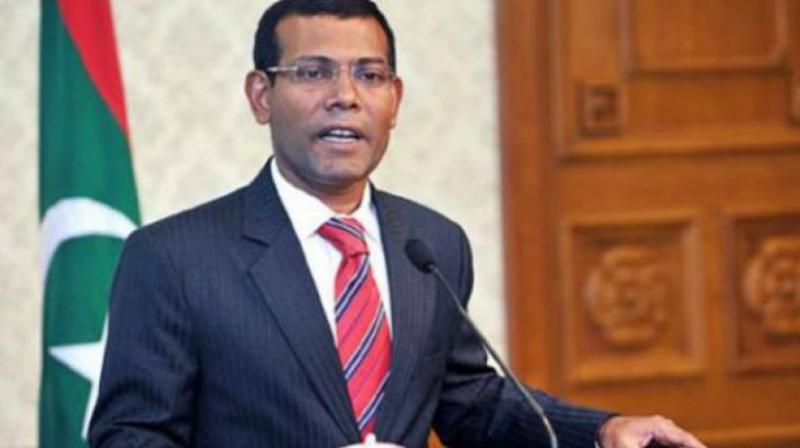Without firing a single shot, China grabbed more land than the East India Company'
A couple of months earlier, Abdulla Yameen Abdul Gayoom was welcomed at the Great Hall of the People by Chinese Premier Xi Jinping.

Bengaluru: On Tuesday, February 20, the 15-day state of emergency declared in the Maldives will be lifted. But the crisis that erupted when the Supreme Court quashed terrorism charges against nine political prisoners, including exiled former President Mohamed Nasheed is unlikely to go away.
"There are restrictions on freedom and our journalists are lying in intensive care, after violence that erupted as recently as last night. In a country like yours, a liberal nation with good books, good food and good movies, this is a crisis indeed. However, this has been our state of being, for a century. To me, this is not an emergency," declared President Nasheed at a thought conclave organized by a leading newspaper in Bengaluru on Saturday.
"In my mind, the crisis stems from two reasons: Land grab and the state within the state," adding, "I ran a Google search on 'land grab' and nothing comes up. Nobody knows what is happening in the Indian Ocean countries."
A couple of months earlier, President Abdulla Yameen Abdul Gayoom was welcomed at the Great Hall of the People by Chinese Premier Xi Jinping. This was a landmark moment in the history of the country followed by the signing of the Free Trade Agreement with China. Now, what Jinping described as "familial" bond is being put to the test, with the impact rippling through to India, resulting in what appears to be a scramble for influence in a nation gripped by political turmoil and growing religious fanaticism.
To President Nasheed, however, the true war is being fought "without a single shot fired." The crisis he sees is a nation crippled by ever-increasing debt that places its sovereignty more and more in the hands of China. This is in keeping with Xi Jinping's goals for his country: a more proactive role which will help leverage its economic power and thereby, political influence. "70% of our debt is to China," said President Nasheed. "By 2020, we will have to repay this and we cannot, which means relinquishing our sovereignty."
Under President Gayoom, he says, FDI has taken a dangerous turn, with projects undertaken at huge expense, financed through commercial loans or by creditors. "FDI needs to be backed by a tender process and transparency. Without firing a single shot,, China has grabbed more land than the East India Company at the height of the colonial era. FDI has been weaponised. Instead of rifles, the weapons in the new colonial arsenal are bribery, corruption and dubious industry."
The impact of this were felt - and did not go unnoticed - during President Nasheed's regime. Even so, a Chinese Embassy was set up in the Maldives and the growing jihadist forces were granted freedom of expression. "The wheels were in motion and there was very little I could do," he said. "As for the ISIS presence, I did believe that giving them freedom of expression would allow us to engage and better understand their beliefs. Not doing so might have pushed them underground. If I could go back in time, would i do things differently? Yes. I would."
With the Maldives due for election this year, the actions of the President Yameen are of even greater concern. "One of the most worrying aspects for me is the arrest of former President Maumoon Abdul Gayoom," said Nasheed. "Since his ascent to power, President Yameen has dismantled the Supreme Court, arrested all the members of the opposition and his predecessor. This has been the trend in the Maldives, one we tried to break." Despite being under tremendous to follow in these undemocratic footsteps, President Nasheed resisted, he says. "We questioned him once but did not harm, threaten or intimidate him in any way." The former president also appealed to India a few days ago, requesting an Indian envoy with the army to come to Male. "This is a defining moment in the Indian Ocean. We must depart from the past now," he explained. "Much has been said about India not having deep enough pockets to make significant investments but I disagree with this. Backed by tenders, I think India's potential for FDI in the Ma
ldives is far more sustainable than that of any other Indian Ocean country."
As his talk neared its end, a journalist questioned President Nasheed's misgivings about China's decision to play a more proactive role in the workings of its neighbours. "This is a strategy the United States has employed to bring about stability across the world," he said. The former President's response was swift, "And has stability been established?"

